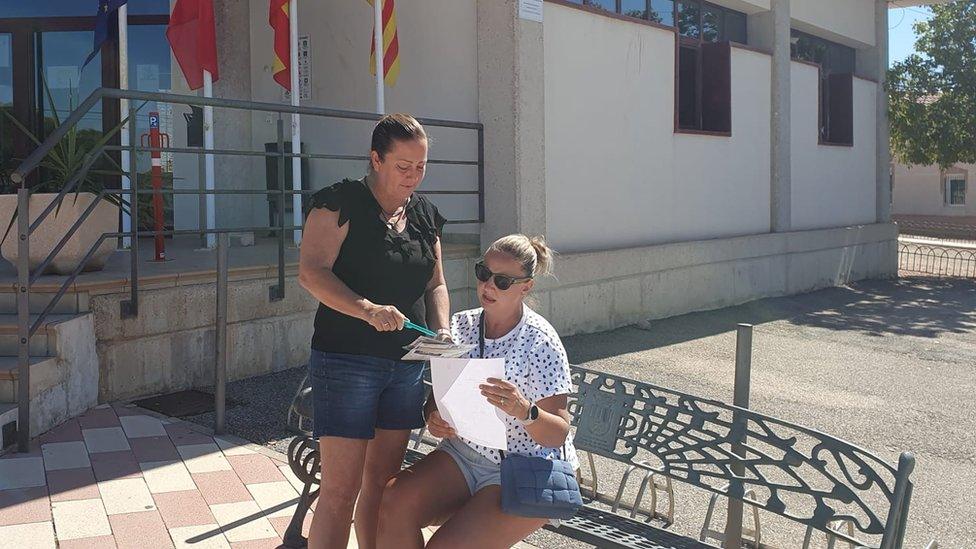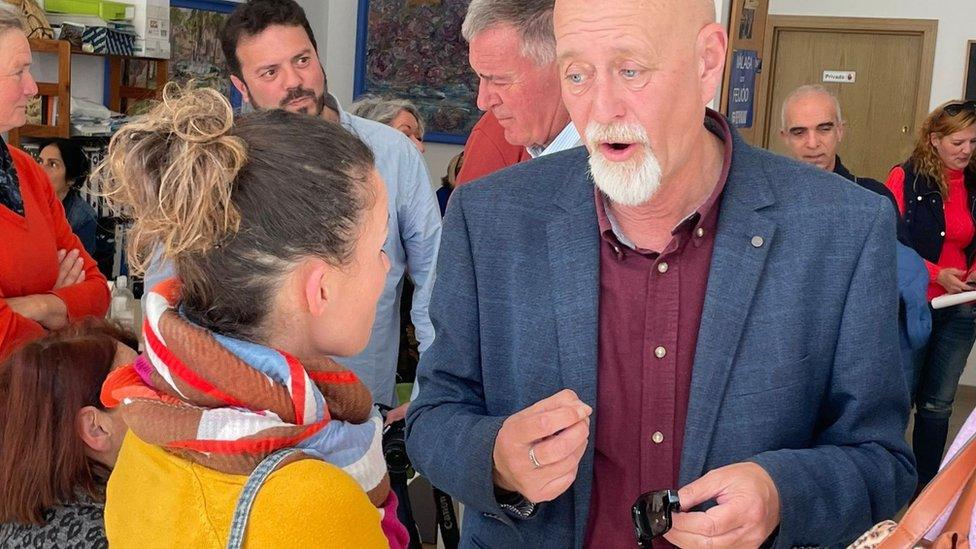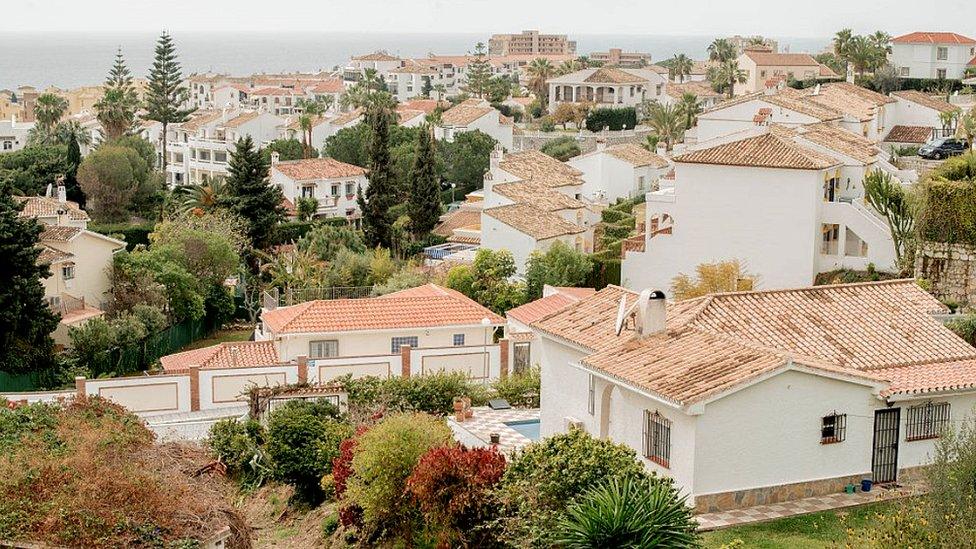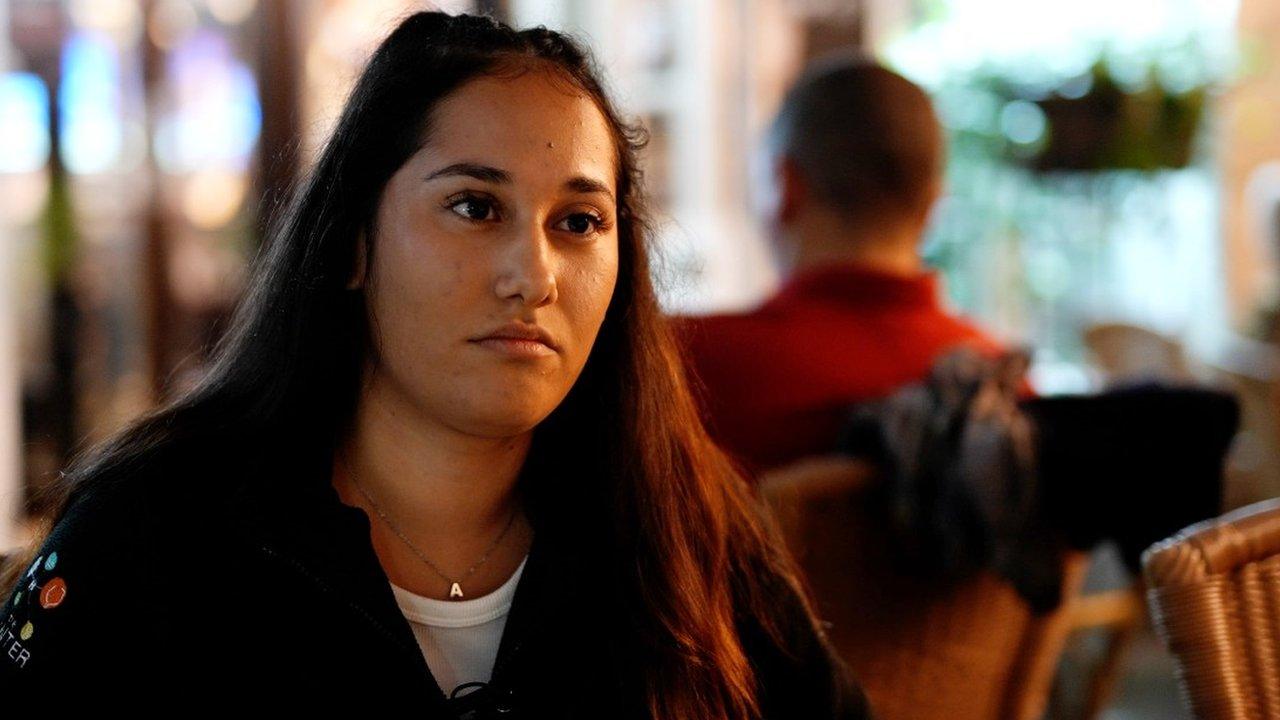Wooing expat voters with post-Brexit woes in Spain
- Published

Samantha Hull, a councillor in Spain, says she thinks a lot of British people have left her town since Brexit
Among the local government team in Spain's Costa Blanca region, a name with a distinctly British ring to it stands out.
Samantha Hull, a British teacher and incumbent councillor for the Spanish Socialist Workers' Party, the PSOE, is running for office in the Alicante town of San Fulgencio.
She's hoping to woo some of the thousands of British nationals - commonly known as expatriates, or expats - to vote for her party in local and regional elections in Spain this month.
Alongside Spanish citizens, they share the same age-old election gripes about everything from bin collections to taxes, with one notable exception: Brexit.
Although the UK voted to leave the European Union in 2016, British nationals are still adjusting to post-Brexit rules that make it more complicated to live, work, vote and travel in Spain and other EU countries.
For some of the 400,000 British expats estimated to be living in Spain, the local elections on 28 May will be a chance to make their voice heard at the ballot box.
Surveys suggest British expats who voted in the 2016 referendum overwhelmingly favoured remaining in the EU.
In regions popular with British expats, their votes could swing elections one way or another.
Under the radar
As a councillor in the whitewashed mountain town of Mijas in the Costa Del Sol, Bill Anderson is plugged into the mood of the 9,000 British residents living here. They represent the largest community of foreigners and about 10% of the town's total population of 93,000.
Mr Anderson, who moved to Spain about 20 years ago, says the Spanish government made it easy for British expats like him to claim residency.
Under the Brexit withdrawal agreement, external, British nationals who have lived in Spain legally before 1 January, 2021, are entitled to apply for residency.
"But there are groups it's been made difficult for", says Mr Anderson, who's in opposition with the conservative People's Party in Mijas.

One such group is the under-the-radar Brits who never registered as Spanish residents before the UK left the EU and have been unable to prove they were living in the country.
Although their number is unknown, Mr Anderson says these people are "in a situation where if they leave and come back, the Schengen clock is going to start ticking for them".
That's because since Brexit, British citizens are only allowed to live in countries within the EU's Schengen zone for up to 90 days in a six-month period without a visa.
"I'm not a huge fan of the EU," says Mr Anderson. "But I am a fan of what it allowed in terms of Brits spending time in Europe. That's been a big loss."
Demographic change
In San Fulgencio, Ms Hull has noticed a population shift she links to the 90-day rule. A few years ago, Brits were said to outnumber locals in the town of about 9,000 people.
Now, British bars and restaurants are struggling to get staff, says Ms Hull.
"It's not like the old days. It's so much harder for British people to come out and enjoy Spain. It's a shame."
In areas with large numbers of UK expats, there is an electoral incentive for Spanish parties to put forward British candidates.
Even in parts of Spain with very few expats, some British candidates think they can appeal to foreigners in a way natives cannot.
In northern Spain's Basque Country, for example, the People's Party has picked Richard Lewington to be one of its candidates in Onati. Mr Lewington, who used to live and work as a teacher in the town, says there's "a fear of being publicly associated" with the party.

Richard Lewington has been campaigning with Spanish candidates in Onati (pictured here)
At the last local elections in 2019, the People's Party didn't win any seats on Onati's council, which is led by a political coalition of Basque nationalists.
While that's unlikely to change after May's elections, Mr Lewington says Onati seems to have "transformed in terms of migration" since he lived there.
These days, the streets seem to be "full of immigrants", says Mr Lewington, the Madrid Representative of UK Conservatives Abroad. "That could work in my favour."
But in Onati and elsewhere in Spain, there's doubt over how much weight the British expat vote will carry this year.
Voter registration
Spain and the UK have an agreement, external on mutual recognition of the right to vote and stand in local elections. To be eligible to vote, Britons had to meet a certain criterion and register before 15 January this year. In the future, they must re-register for every election they intend to vote in.
Only 36,543 of the estimated 400,000 living in Spain registered to vote in these local elections.
Bremain in Spain, which campaigns to protect the rights of British migrants, says "many will be caught out by a general lack of awareness that re-registration is now necessary".
In San Fulgencio, "there's a lot of apathy with that process", says Ms Hull.
The councillor predicts a depressed British vote in her town this year. But some expats have become more politically engaged after Brexit.
"A lot of the British are saying, if I had my time again, I wouldn't vote for [Brexit], how stupid was I?" says Anne Hernandez, founder of the Brexpats in Spain support group.
She said many expats "now realise how important their vote is because it can change things".

Bill Anderson says Brexit has made it more difficult for some Brits to live in Spain
Leandro Busto was among those who voted for change in 2016, and would do so again.
He's a founding member of UK Conservatives Abroad in Spain and was considering standing as a candidate in this year's local elections.
The Spanish elections will be the first time he's been able to vote since the Brexit referendum.
He lost his entitlement in the UK under a time limit on voting rights for British citizens who have lived overseas for more than 15 years. He expects to get his voting rights back, though, after the UK Parliament passed a law, external to remove the 15-year rule last year.
Divorces can be messy, Mr Busto says, adding: "I knew there would be hiccups."
Unlike some of the Brexit pessimists within the British expat community, Mr Busto is prepared to be patient for the UK to reap the potential rewards of leaving the EU, even if that makes life more difficult for him within it.
"I've got no doubt that by the time I retire, the UK will be flying ahead and Spain will have the same problems," he says.
- Published12 January 2021

- Published25 January 2023

- Published15 December 2022
